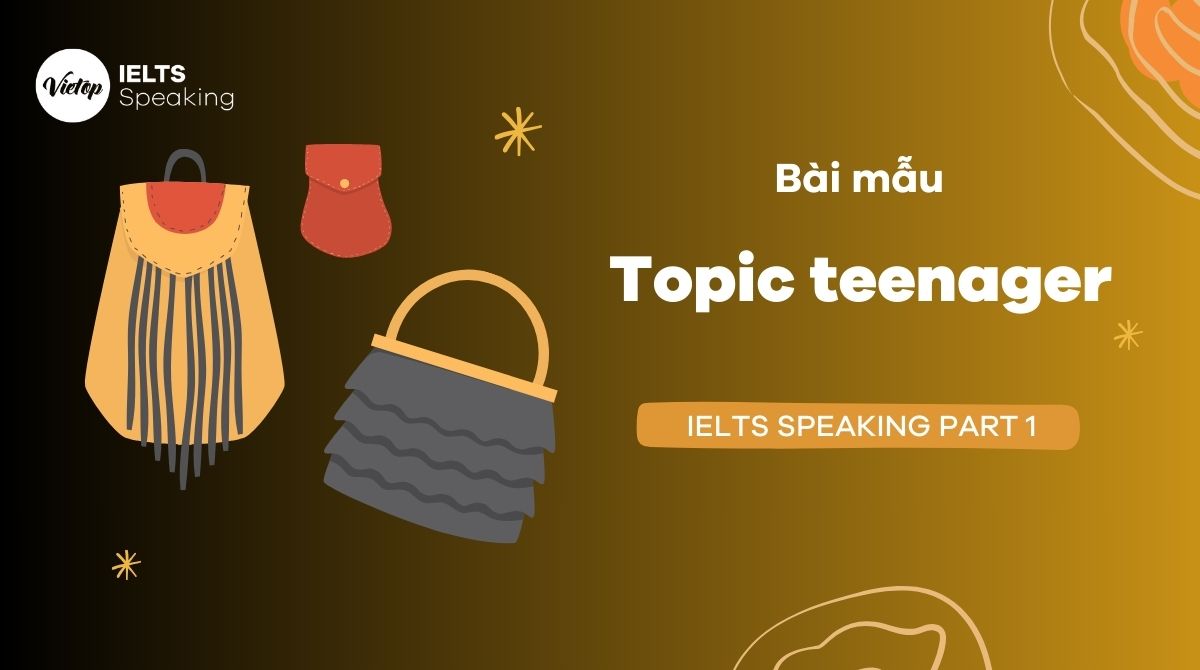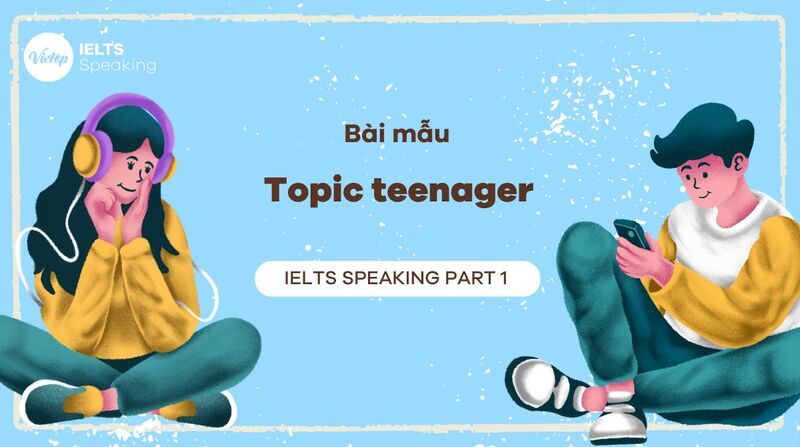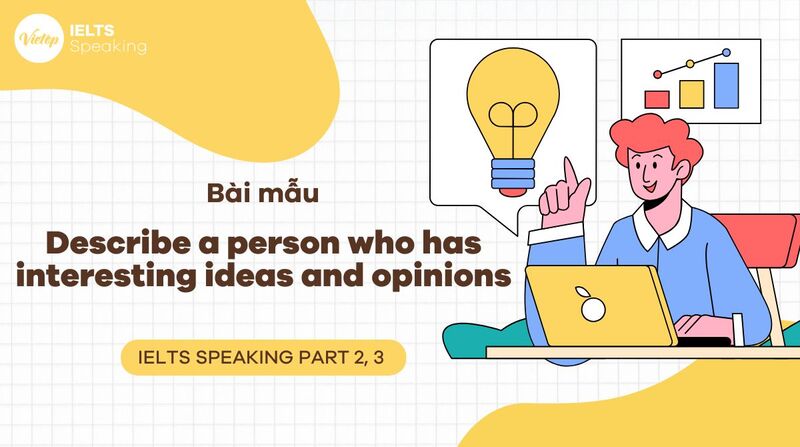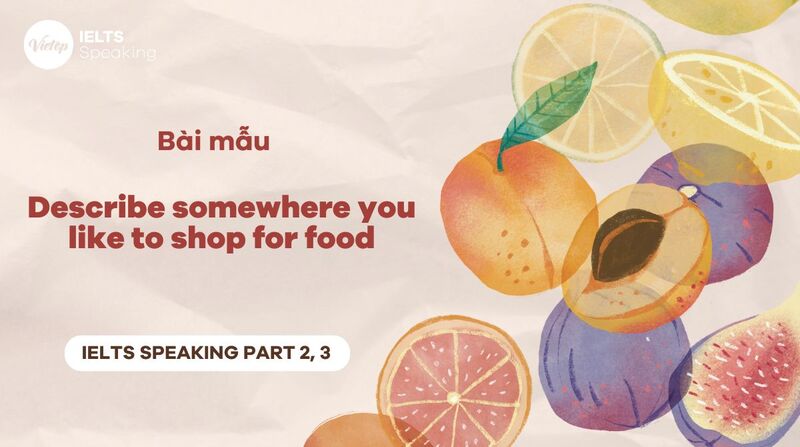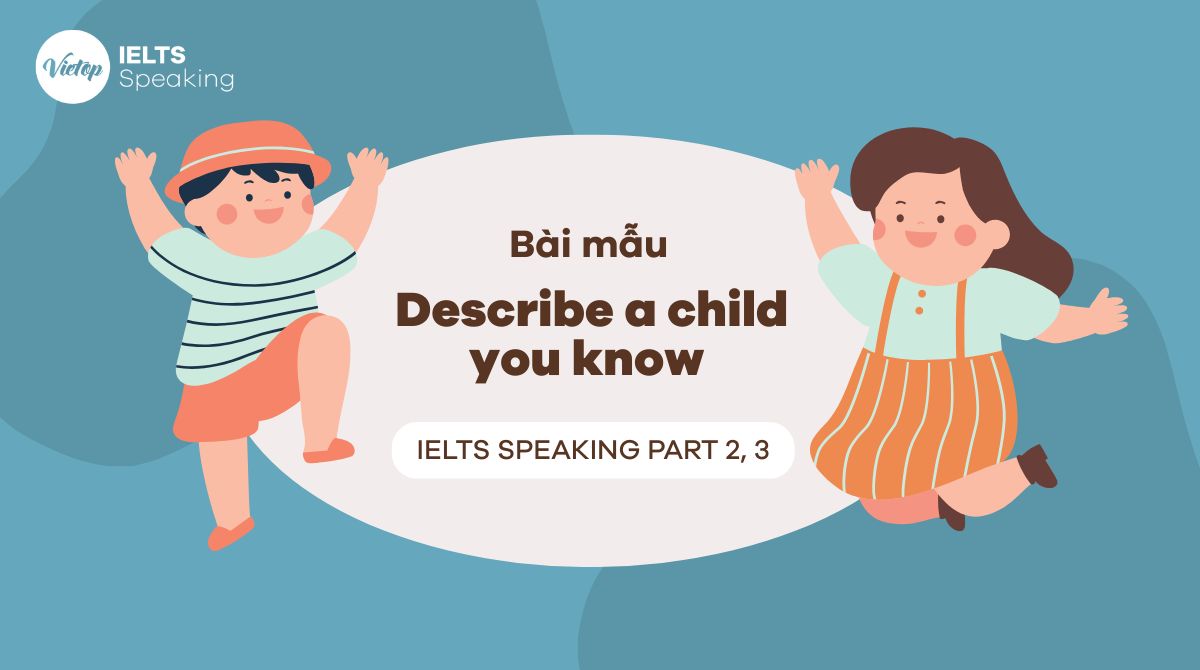Luyện thi Vietop English gửi bạn bài mẫu giải đề Speaking ngày 26/12/2022, cùng tìm hiểu và luyện tập IELTS Speaking thật tốt nhé!
![[ACE THE TEST] Giải đề Speaking ngày 26/12/2022](https://vietop.edu.vn/wp-content/uploads/2023/02/giai-de-speaking-26122022.png)
IELTS Speaking Part 1: Healthy lifestyle
1. Is it important to you to eat healthy food?
To be honest, I’ve always cared more about the taste of the food that I eat. Lots of things I consume can be deemed unhealthy. For example, milk tea and fried vegetables.
- To deem (v): đánh giá
2. If you catch a cold, what do you do to help you feel better?
When I get a cold, I wear thick and warm clothes. I also drink warm water and eat easy-to-digest food such as rice congee. Another thing that I would do is to rest as much as possible.
- To digest (v): tiêu hóa
- Rice congee (n): cháo
3. Do you pay attention to public information about health?
I believe I do. We all know that the coronavirus is far from being gone. I watch and read religiously the news about covid to protect myself and my family.
Religiously (adv): thường xuyên
4. What could you do to have a healthier lifestyle?
I think exercising regularly, having enough sleep, and eating well are what I could do. They seem simple, but it takes a lot of discipline to accomplish them.
- Discipline (n): kỷ luật
- To accomplish (v): hoàn thành
Xem thêm:
Bài mẫu Describe Your Favorite Season – IELTS Speaking Part 2
Ghi nhớ những Collocations for IELTS Speaking phổ biến
IELTS Speaking Part 2
Describe a time when you were ill
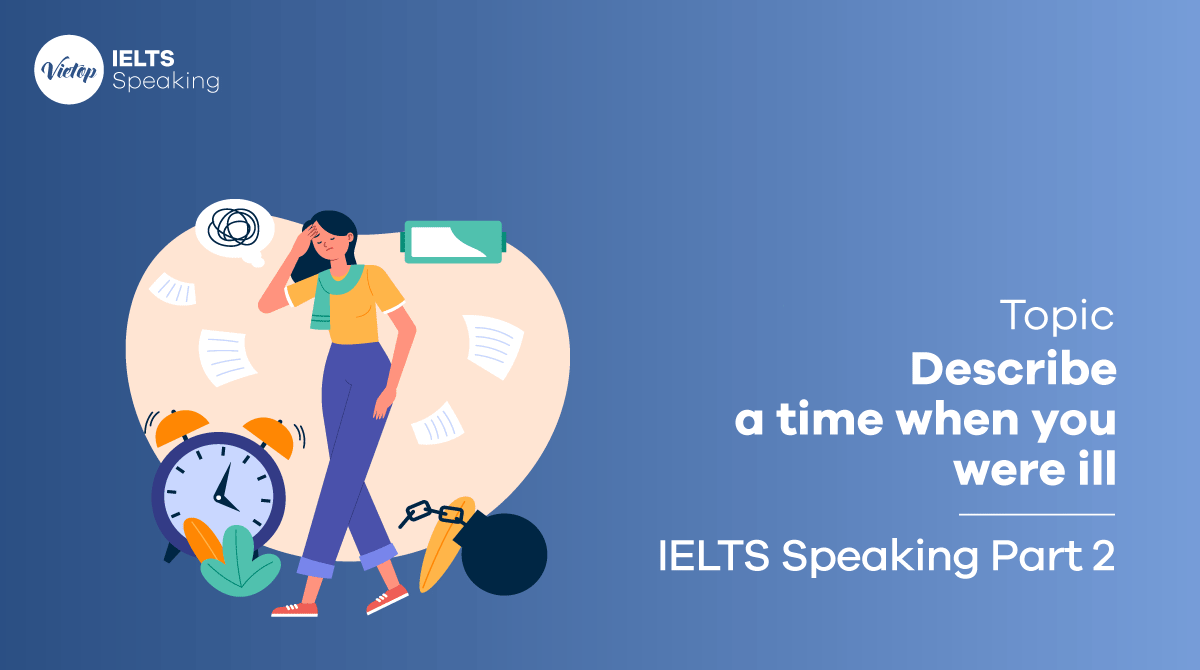
You should say :
- when this was
- what your symptoms were
- how long the illness lasted
And say how it affected your life at the time.
Well, the last time I was sick was memorable to me as it happened on the day in which I had an important exam.
I can still remember it was a Monday, I woke up in the morning finding I was still at my desk. The windows were wide open, and the air was freezing. I had tried to study the night before but fell asleep. My head was heavy and aching and my throat was sore. I tried to move but I didn’t have any strength. I stayed still in the same position for 20 minutes before I moved myself to my bedroom.
Soon after, I realised that my math exam was in the afternoon, and I panicked. I called my mom and she told me to not worry. Knowing that I was hungry, she made me a huge bowl of rice congee with chicken and ginger. This is my family’s remedy when someone comes down with a cold. After having it, I immediately felt better and I took some pain killer to alleviate my headache; then I took a long nap. About an hour before my exam, my mom woke me up and gave me a ride to school.
Even though I didn’t fully recover, I did quite well on the exam. After that, I took 2 days off to rest and recover.
- Aching (adj): đau
- Throat (n): cổ họng
- Sore (adj): đau (nhưng thường hay dùng cho throat)
- To stay still: giữ nguyên vị trí
- Remedy (n): cách chữa (mang tính tự phát/dân gian)
- To alleviate (v): giảm nhẹ
→ Topic là dạng kể chuyện, yêu cầu thí sinh kể về một lần bị bệnh. Như câu trả lời gợi ý, thí sinh nên trả lời từng tình tiết trước sau và xâu chuỗi bằng các cụm từ liên quan đến trình tự (soon after, then, after that, in the beginning,etc.) Câu hỏi này là cơ hội để thí sinh thể hiện từ vựng về cảm giác của bản thân khi bị bệnh.
Bạn nên chuẩn bị các từ vựng về triệu chứng như aching, sore, painful, dizzy, etc. và cảm giác của bản thân như panic (n), disappointed (adj), afraid (adj). và các từ về giảm nhẹ như to relieve, to alleviate. Trình tự kể chuyện gợi ý: mở đầu → triệu chứng ban đầu → ảnh hưởng đến hoạt động lúc đó → kết câu chuyện.
Tham khảo:
Bài mẫu Topic Advertisement – IELTS Speaking Part 2,3
Bài mẫu Describe a place – IELTS Speaking Part 2
Top 52 Chủ đề IELTS Speaking Part 2 thường gặp nhất trong bài thi
IELTS Speaking Part 3: Healthcare

1. Do you think all illnesses can be prevented?
Technically, if we can identify what causes an illness, we can devise preventive measures. But unfortunately, there are a lot more factors involved. For example, everyone knows that to prevent contracting a common flu virus, we should not come in contact with a person who is sick with this flu; but then there’s no way to know if a person is infected just by looking at them. So sometimes we still unknowingly interact with infected people and also become infected.
- To devise (v): đề ra
- To contract (v): nhiễm/mắc bệnh
- Infected (adj): nhiễm
→ Câu hỏi yêu cầu thí sinh nêu nhận định cá nhân về liệu tất cả bệnh đều có thể được ngăn ngừa. Câu trả lời gợi ý thiên hướng “no”. Câu mở đầu công nhận là về mặt lý thuyết điều này là có thể tuy nhiên thực tế thì phức tạp hơn và cho ví dụ.
2. Do you think that illnesses will be less common in the future?
I’m optimistic about this prospect. While we will never eradicate all illnesses, progress in medical science and improved living conditions will help us avoid certain diseases. Take chicken pox for example, it used to be for people who contracted it. However, thanks to chicken pox vaccines, it has been under control for decades.
- Prospect (n): viễn cảnh
- To eradicate (v): diệt/xóa sổ
→ Câu hỏi yêu cầu thí sinh đánh giá về khả năng trong tương lai rằng bệnh tật sẽ ít xuất hiện hơn. Câu trả lời gợi ý là có và khai triển bằng cách nêu ví dụ cụ thể về một bệnh trước không có thuốc chữa nhưng bây giờ thì có.
Xem ngay: Khóa học IELTS Cấp tốc – Cam kết tăng ít nhất 0.5 – 1.0 band score SAU 1 THÁNG HỌC
3. Do you think healthcare should be free?
I am in the camp that says healthcare should be granted for everyone. Now, I know that opponents of free healthcare often have a problem with the enormous amount of tax these programs require. My rationale is as simple as this: if we can provide free treatment for people when their illness is still mild, fewer people will die or be hospitalised from severe illnesses. We can create a healthier society. In the long term, our society is stronger and more productive and so will offset the tax money that has gone to healthcare.
- Opponent (n): người phản đối
- Rationale (n): cách suy nghĩ/sự lý giải
- Mild (adj): nhẹ (mức độ không phải chỉ cân nặng)
- To offset (v): bù lại
Luyện tập IELTS Speaking với bài mẫu IELTS Speaking part 2 và IELTS Speaking part 3 nhé!
→ Câu hỏi yêu cầu thí sinh đánh giá các dịch vụ chăm sóc sức khỏe có nên được miễn phí hay không. Bạn có thể trả lời là có, như câu trả lời gợi ý. CÂu trả lời trên được khai triển bằng cách nêu ra ý kiến phản đối (tax required) rồi phản biện lại bằng lý giải của cá nhân là nếu người trong một xã hội khỏe mạnh thì làm xã hội khỏe hơn, về lâu dài sẽ bù lại được số thuế đó. Lưu ý bạn cũng có thể trả lời ngược lại là “không” và đưa ra suy nghĩ cá nhân.
4. What makes someone a good doctor?
From my point of view, a good doctor is a knowledgeable practitioner in their field and someone who is sympathetic to their patients. The first quality is obvious, but not every doctor is good at comforting their patients. Apart from diagnosing, doctors also have to report their diagnosis to their patients. Sometimes, they have to deliver the bad news and they should do it in a way that doesn’t devastate the patients and make their situations worse.
- Sympathetic (adj): thông cảm
- Comforting (n): an ủi
- To diagnose (v): chẩn đoán
- Diagnosis (n): kết quả chẩn đoán
→ Câu hỏi yêu cầu thí sinh đưa ra nhận định thế nào là một bác sĩ tốt. Câu trả lời gợi ý đưa ra hai tiêu chí đó là một bác sĩ có kiến thức hành nghề tốt và một bác sĩ có thể cảm thông cho bệnh nhân. Phần khai triển tập trung vào tiêu chí thứ hai (vì tiêu chí thứ nhất là hiển nhiên). Khai triển bằng cách lý giải rõ ràng hơn (vì bác sĩ phải thông báo và tư vấn cho bệnh nhân)
Tham khảo:
Giải đề Speaking ngày 03/12/2022
Trên đây là giải đề Speaking ngày 26/12/2022, hy vọng đã giúp bạn có nhiều từ vựng và ý tưởng hơn để triển khai trong phần thi của mình nhé! Và nếu đang luyện thi IELTS thì hãy liên hệ với Vietop để được tư vấn nếu học mãi mà vẫn chưa nâng điểm được nhé.

